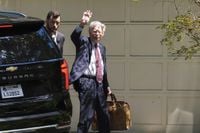Federal agents’ August 22, 2025, raid on the Maryland home and Washington, D.C. office of former National Security Adviser John Bolton has brought a simmering national security controversy back into the public spotlight. Unsealed court records released September 4 reveal that the FBI seized a trove of electronic devices and documents as part of a revived investigation into whether Bolton mishandled classified material—an inquiry that now echoes the high-profile Espionage Act probe once faced by former President Donald Trump himself.
The search, authorized by Chief Magistrate Judge Timothy Sullivan on August 21, was conducted in connection with allegations that Bolton illegally removed and retained Department of Defense information and other classified documents during his tenure as national security adviser from 2018 to 2019. According to The Associated Press and The New York Sun, agents confiscated two iPhones, a hard drive, two USB drives, three computers, a white binder labeled “Statements and Reflections to Allied Strikes,” folders marked “Trump I-IV,” and four boxes containing printed daily activities. The warrant also instructed agents to conduct keyword searches on Bolton’s devices for any evidence related to the alleged violations.
The investigation’s public unveiling came after a coalition of more than a dozen news organizations petitioned for unsealing the warrant and related materials, arguing that “the powerful interest in evaluating the government’s request to search the home of a former high-ranking official turned prominent critic of the President” outweighed the need for secrecy. Federal prosecutors did not oppose the release but requested redactions to protect privacy and the integrity of the ongoing probe, as confirmed in court records and reported by SAN and AP.
This is not the first time Bolton has faced scrutiny over his handling of sensitive information. The Justice Department previously attempted to block the 2020 publication of his memoir, The Room Where It Happened, arguing it contained classified details. Although a federal judge allowed the book’s release, the controversy didn’t dissipate. According to The New York Times, a foreign adversary’s intelligence service reportedly intercepted emails Bolton sent during Trump’s first term using an unclassified system, which allegedly included classified materials. Sources familiar with the matter told the Times that these emails were sent as Bolton gathered material for his memoir, a claim that has further fueled the current investigation.
Adding to the intrigue, CIA Director John Ratcliffe reportedly briefed FBI Director Kash Patel on the intercepted materials earlier this year. Patel, who is now serving as FBI director under President Trump’s second administration, ordered the August raid, effectively reopening a case that the Biden administration had previously closed. “This is a national security case that was closed by the Biden administration. Kash reopened it, and Kash reignited it,” an FBI official told The New York Sun.
The scope of the investigation is sweeping. The search warrant cites two criminal statutes: one making it a crime to gather, transmit, or lose national defense information, and another prohibiting the unauthorized removal and retention of classified documents. These are the same laws that formed the backbone of the Espionage Act charges once levied—though ultimately dismissed—against Donald Trump following the 2022 FBI search of his Mar-a-Lago estate. Special Counsel Jack Smith had charged Trump with 31 counts related to classified documents, but District Court Judge Aileen Cannon dismissed the case in 2024, ruling that the Justice Department had improperly appointed Smith to his role. After Trump’s reelection, Smith’s prosecutions ended.
Bolton’s lawyer, Abbe David Lowell, pushed back forcefully against the investigation’s motives. In a statement on September 4, Lowell argued, “The Justice Department was under pressure to satisfy a president out for political revenge. The materials taken from Amb. Bolton’s home are the ordinary records of a 40-year career serving this country at the State Department, as an Assistant Attorney General, the U.S. Ambassador to the United Nations, and National Security Advisor. Any thorough review will show nothing inappropriate was stored or kept by Amb. Bolton.”
Despite the gravity of the allegations, no charges have been filed against Bolton as of early September. The unsealed records do not specify whether new evidence has emerged or if the investigation has advanced beyond its earlier stages. Still, a senior law enforcement official told The New York Sun that the Trump administration is “pretty confident” it now has a strong case against Bolton.
Bolton, for his part, has not been deterred by the legal heat. In an op-ed published September 5 in The Washington Examiner, he directly addressed the search and continued his criticism of Trump, particularly regarding the administration’s Ukraine policy. “The administration has tried to camouflage its disarray behind social media posts,” Bolton wrote, “such as Trump comparing his finger-pointing at Russian President Vladimir Putin to then-Vice President Richard Nixon during the famous kitchen debate with Nikita Khrushchev. Why Trump wants to be compared to the only president who resigned in disgrace is unclear.”
The political undertones of the investigation are hard to ignore. Bolton’s relationship with Trump has been fraught since his abrupt departure from the White House in 2019—a split marked by sharp disagreements over Iran, Afghanistan, and North Korea. Trump revoked Bolton’s security clearance in January 2025, along with those of 49 other former national security officials. The animosity has only intensified, with Trump publicly dismissing Bolton as “stupid” and a “sleazebag,” while Bolton’s memoir and subsequent media appearances have painted Trump as “unfit to be President” and dangerously susceptible to manipulation by foreign leaders.
The revived probe has also drawn comparisons to Trump’s own legal battles over classified documents. Trump, who has repeatedly condemned the Mar-a-Lago search as an egregious invasion of his family’s privacy, expressed rare sympathy for Bolton: “I know the feeling is not a good feeling,” he said, while maintaining his disdain for his former adviser.
Bolton’s case has become a lightning rod in the broader debate over the politicization of national security investigations. Supporters of the investigation argue that no one—regardless of political stature—should be above the law when it comes to safeguarding classified information. Critics, including Bolton’s legal team, contend that the probe is less about justice and more about settling political scores, especially given Bolton’s outspoken opposition to Trump and the timing of the case’s reopening.
As the investigation unfolds, the public is left to grapple with questions of accountability, transparency, and the proper boundaries between national security and political retribution. The outcome of the Bolton probe could set precedents not just for the handling of classified materials, but for the treatment of political adversaries in the highest reaches of government. For now, the story is far from over, with both sides digging in and the nation watching closely for the next twist.


